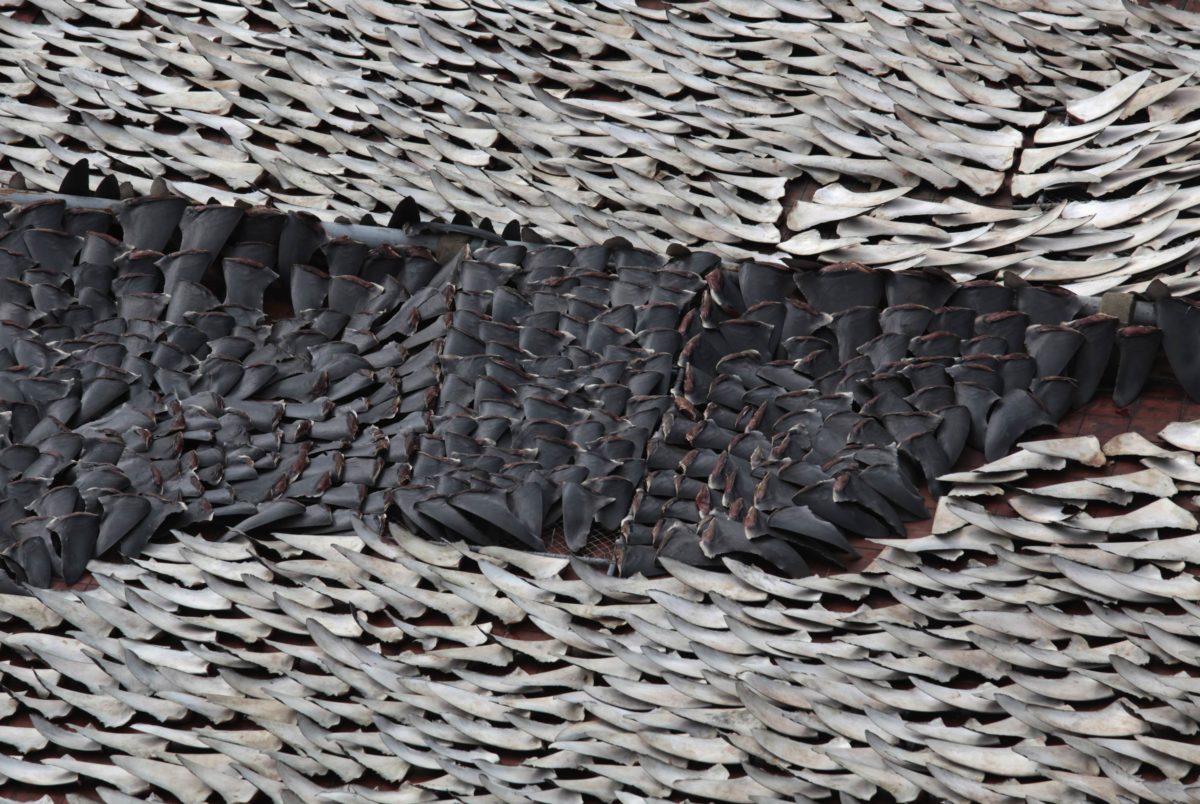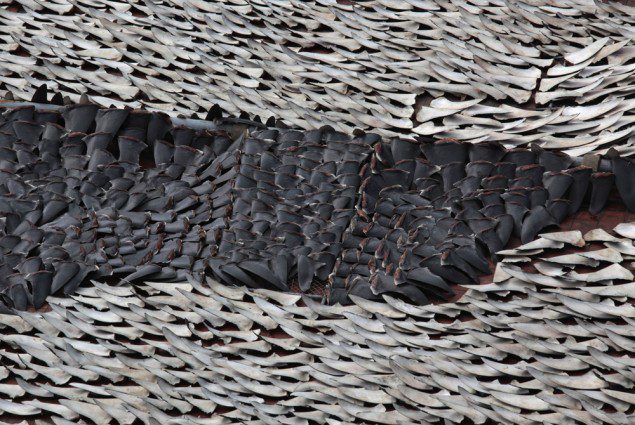Could Clean Startups Boost The Chemical Tanker Market?
During their last quarterly update Overseas Tanker Corp ($OSG) discussed the growth of a new cargo segment for oil tankers: renewable diesel. Could chemical tanker companies be the next to...

The following images depicts a tragedy which is quietly unfolding around the world.

On top of a factory building in Hong Kong, over ten thousand shark fins are being dried and readied for sale on the Chinese market for use in shark fin soup, a gourmet and highly controversial food.

These fins ended up here from shark catchers worldwide who are driven by a growing Chinese demand for this ingredient. In 2007, the global value of the shark fin trade was recently estimated to lie in the range of US$400–$500 million per year.* Ironically enough however, shark fins have little to no taste, it’s the unique texture they add to soup which makes them highly desirable.
In a 2009 study conducted by the International Union for Conservation of Nature (IUCN), it was determined that of the 64 species of pelagic sharks and ray assessed, 32 percent were threatened or near-threatened with extinction. In their report, they estimated the amount of shark fins passing through the Hong Kong fin market translated to the taking of 26 to 73 million sharks annually (Clarke et al. 2006a).
“This represents a biomass of 1.21 to 2.29 million tonnes, excluding sharks taken by fisheries whose fins do not reach this market, perhaps because they are discarded dead or consumed locally,” the report notes.
Comparing this to the 2.2 million tons of squid caught in 2002, of which the shark is a significant natural predator, the imbalance is clear. With a vastly longer reproductive cycle than the squid, shark populations are losing their battle with humans. Until recently however, very little has been understood about sharks by the global scientific community.
“Despite mounting threats, sharks remain virtually unprotected on the high seas,” says Sonja Fordham, Deputy Chair of the IUCN Shark Specialist Group and Policy Director for the Shark Alliance. “The vulnerability and lengthy migrations of most open ocean sharks mean they need coordinated, international conservation plans. Our report documents serious overfishing of these species, in national and international waters, and demonstrates a clear need for immediate action on a global scale.”
Among the species listed as vulnerable to extinction is the Great White Shark, Carcharodon carcharias.
The implications could be far worse than simply the loss of a species however, the loss of the “alpha predator” could result in serious repercussions to the entire ocean food chain as sharks are one of the main natural predators of squid, a species which by some are referred to as the “locusts of the sea.”
It comes down to the reality that the global scientific community has simply not had the tools, methods, or funding in place to study these creatures, and thus affect policy change. That is, until Chris Fischer and his team at OCEARCH pioneered a new process of catching and releasing tagged great white sharks and opened up their arms to the top researchers and media outlets.
In 2007, Chris Fischer created OCEARCH with a simple mission: to help raise awareness of global marine conservation and further research efforts into great white sharks. Since its inception, OCEARCH has raised over $10 million for shark research while leading scientific expeditions around the world’s oceans. The OCEARCH team was most recently featured on the hit television series ‘Shark Wranglers’ on the History Channel, receiving national acclaim for the team’s trailblazing research into the unsolved mysteries of great white sharks.
The conduit to the increasingly significant research findings of the OCEARCH team has been the MV OCEARCH, a CAT-powered 126’ vessel equipped with a custom 75,000 hydraulic lift and research platform with the capability of handling 5,000 pound sharks. Repowered in 2011 with support from Milton Cat and Elite Diesel, the MV OCEARCH features 2x Cat 3412 engines, C4.4 and C6.6 generator sets while serving as an at-sea laboratory.
I met up with Chris Fischer in New Orleans this past December to get a bit more insight into what OCEARCH is all about and hear what he and his colleagues have accomplished so far.
He noted that in 2006, he met a scientist who said to him, “You know Chris, we have global crisis with sharks in that we don’t know anything about their lives. They are too big for us to catch, study with the latest technology, while letting them go alive.”
This was the spark that got the gears turning in Fischer’s mind. He knew then and there that this was a challenge that he and his guys were ready for. His mission from then on was to, “give the ocean a global voice and effect change” which was something that he admitted he could not do before while known as the “fishing guy” from hit TV series, Offshore Adventures.
“We didn’t even know where mature great white sharks, or tiger sharks breed, or give birth, and if you don’t have that fundamental life history data, you can’t even affect policy correctly,” Fisher commented. “I started assisting the world’s top shark scientists giving them the access and the technology resources they had never had.”
“While we had these sharks in the lift, we were going to do things that had never been done before. For example, most people die when they get bitten by a shark from secondary infection. Or they lose a limb from secondary infection. Because we have access for the first time ever, we are getting live bacteria off their teeth and tongue, sending them to be cultured to create the first shark-bite antibiotic. There was all this work that these scientists were beginning to dream up because for the first time in their lives, they now had fifteen minutes of access to these sharks before they were let go alive.”

“The holy grail of the research,” Fisher notes, “is finding the shark nurseries, because that’s where they are most vulnerable to gill nets. Once they become mature, they just destroy that kind of stuff.”
“I remember the fear of heading out on the first trip off Guadalupe Island off Ensenada, about 22o miles off Baja. A group of guys with no book, not quite sure it could be done. The biggest tackle in the world, and we went out there and got destroyed, and humbled. We had white sharks breaking the biggest hook in the world, destroying 2000 pound cable, but finally we got one. We got it in the lift, and we got a tag on it, and we released it.
At that moment, we knew it could be done, and that emotionally, and mentally, was a real relief.
I had taken all of the last personal funds I had and had funded this research just to give back to the ocean because the ocean had been good to me, and I didn’t care if I lost it all. I had no TV gig, it was just the right thing to do. I just felt like ‘look, if we could just solve this puzzle, even if it breaks me financially, it’d be a great contribution back to the ocean.’ and I had no problem giving it all back.”
From that first two-year study which had started off Guadalupe, we got four full two-year tracks from mature females and they showed us exactly when and where they are breeding, and they led us to the breeding ground, which was in an area that no scientist had ever dreamed it would be. And then we were able to take that data to the Mexican government and begin to affect policy to look after the nursery.”
With requests from scientific institutions and governments around the world, Fischer and his team are now replicating this process and conducting ground breaking research in places like South Africa, Cape Cod, and the western Pacific.
A huge supporter of Chris Fischer and the OCEARCH program has been Caterpillar (NYSE:CAT), the supplier of mission-critical engines that the OCEARCH team needed prior to a recent expedition to South Africa. In an interview in last December with Nigel Parkinson, Managing Director for Caterpillar Marine Power Systems, he commented:
“Chris Fischer clearly has a vision for what he wants to achieve, where he wants to go. He approached us primarily because of the repower opportunity on the vessel he has. I think that opened our eyes up to some things which are very close to our heart.
Sustainability, the environment, and the ocean.
We do a lot of work where our facilities are, particularly the marine side of the business, but we really liked what Chris and his team were trying to achieve. The whole thing around the shark, the apex predator, was a real catch. We saw a lot of similarities between the OCEARCH values and Caterpillar’s values. Their proposition, our brand proposition, we saw a lot of alignment between the two missions that our businesses have, and it seemed like a natural partnership.”
A Partnership with a capital “P”
In a landmark announcement today, Caterpillar Inc. cemented their partnership with OCEARCH by providing the multi-year financial backing needed to support the OCEARCH organization’s global research on sharks.
“We’re proud to associate our two brands, which share common values, high levels of success and a commitment to sustainability,” commented Tom Frake, Vice President of CAT Marine and Petroleum Division.
Because OCEARCH’s work occurs in waters around the globe, Fischer understands and depends on the unmatched support of Caterpillar’s network of dealers.
“Seconds matter in our research,” says Fischer. “The last thing you want is your power supply to fail when you’re trying to tag a two-ton great white shark on the hydraulic lift. If we need a part, I know a call to the local Cat dealer will be answered quickly, and we’ll be back in business. The dependability of Cat equipment along with their global dealer network makes them the ultimate global enabler for our research, and we are proud to call them a partner.”
“Chris doesn’t have to be shown the benefit Caterpillar’s business model can bring to his operation – he intrinsically understands the value because he’s lived it for years,” says Caterpillar Global Brand Marketing Manager Diane Lantz-Rickard. “He believes in our products and support; we believe in the work he’s doing for our planet.
It’s a satisfying match,” says Lantz-Rickard.
OCEARCH embarks on its first CAT-funded expedition on February 21, 2013.
When his crew leaves Jacksonville, Florida, they’ll spend the following 20 days at sea conducting critical research on great white sharks with leading researchers such as Dr. Greg Skomal of the State of Massachusetts and Dr. Robert Hueter of Mote Marine Laboratory in Sarasota, FL
Follow their progress at OCEARCH.com and follow the great white sharks in real time by clicking here: http://sharks-ocearch.verite.com/
*Clarke, S., Milner-Gulland, E.J. and T. Bjorndal. 2007. Social, economic, and regulatory drivers of the shark fin trade. Marine Resource Economics. 22: 305–327.

Sign up for gCaptain’s newsletter and never miss an update

Subscribe to gCaptain Daily and stay informed with the latest global maritime and offshore news
Essential news coupled with the finest maritime content sourced from across the globe.
Sign Up